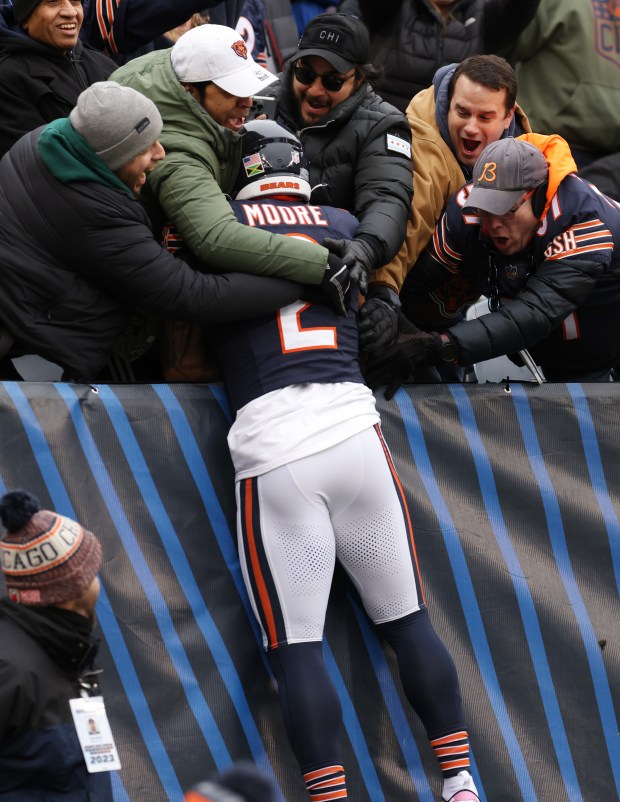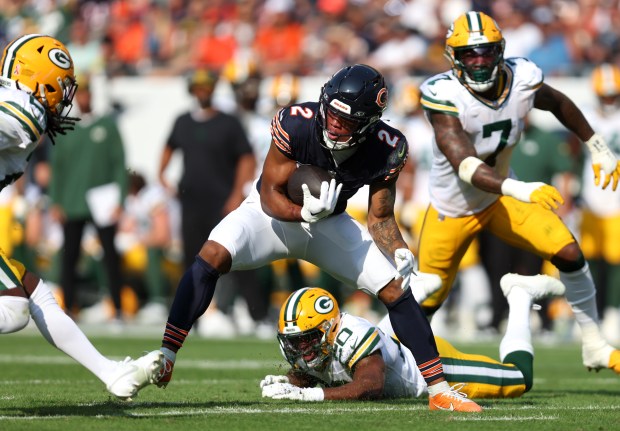Forty-one days until the start of the regular season gives the Chicago Bears and DJ Moore ample time to finalize a new contract for the wide receiver.
Chances are it will be the next significant move for general manager Ryan Poles, and it will be interesting to see if it becomes a topic in upcoming episodes of “Hard Knocks” or if the team can keep business out of sight from NFL Films cameras.
Moore is under contract through the 2025 season, so the situation might not present itself as pressing business for the Bears. However, the marketplace for wide receivers has taken off recently, and Moore last season significantly outperformed a contract he signed while with the Carolina Panthers.
Moore’s base salary for this year is $15.85 million and he already collected a $200,000 bonus for being a participant in the voluntary offseason program. He’s due to earn a base salary of $14.85 million in 2025 with a $1 million roster bonus and another $200,000 workout bonus. He’s due $32.1 million for the next two seasons.
Factoring the money in the current contract Moore previously received in Carolina, his annual average is $20.628 million, which ranks 17th at the position, according to overthecap.com.
Business has been booming for many of the top pass catchers in the league. Justin Jefferson of the Minnesota Vikings became the highest-paid wide receiver with a four-year, $140 million extension ($35 million per season). A.J. Brown, Amon-Ra St. Brown, Jaylen Waddle, DeVonta Smith, Nico Collins, Michael Pittman Jr. and most recently Amari Cooper either have signed major extensions or received raises.
Jefferson, Brown, St. Brown and Tyreek Hill average $30 million or more per season, and eight receivers are at $25 million or more annually.
The NFL salary cap spiked more than $30 million this year to $255.4 million, and other receivers are waiting to be paid. CeeDee Lamb of the Dallas Cowboys, Brandon Aiyuk of the San Francisco 49ers and Ja’Marr Chase of the Cincinnati Bengals are chasing new money. Lamb is a holdout and Aiyuk and Chase haven’t practiced yet, so they are in the early stages of a “hold in,” meaning they’re present but not participating in on-field activities.
Historically, the Bears don’t consider new contracts for players with multiple seasons remaining on their deal. That’s a sound business practice. But there always are exceptions, and Moore’s situation is for a number of reasons.
For starters, the Panthers wrote the contract and the Bears inherited it when they acquired him in the trade that sent the 2023 No. 1 pick to Carolina. Second and more important, the 27-year-old Moore doesn’t need to produce a PowerPoint to show the Bears he was worth more than he was paid last season. Third, it’s a good idea to make sure rookie quarterback Caleb Williams’ best skill-position player is happy and knows he is valued — and the rest of the locker room sees it too.
Moore’s team-first attitude hasn’t gone unnoticed in the building. When he inexplicably was targeted only twice in the season-opening loss to the Green Bay Packers last season, he didn’t say a word at a moment when a lot of players with less cache might have said plenty. With the passing offense struggling nearly all season, Moore was a vocal backer of quarterback Justin Fields, proving that in choppy seas, he has enough common sense not to rock the boat even more.
Poles has skillfully avoided discussing player contracts, knowing it’s sensitive information. But he understands there is a hierarchy to the locker room and an order in which teams must handle business. For instance, it’s impractical for the Bears to consider anything for newcomer Keenan Allen, 32, who is entering the final year of his contract, until Moore has been extended. Maybe the Bears won’t go there anyway with first-round pick Rome Odunze in the fold, but that’s a topic for another day. Considering the rising cost for top playmakers, the Bears will be in a great spot if they have Odunze as a major contributor on a rookie deal for the next several seasons.

Of course, finalizing a deal with Moore will take a lot of work. Moore doesn’t have any guaranteed money remaining in the contract, but his side will battle for every dollar in a pact that could keep him in a Bears uniform into his early 30s.
He displayed his business side in May when referencing the offseason workout bonus that some veterans more interested in time off will forego.
“Two-hundred grand on the line,” Moore said. “Gotta make that money. Outside of that, we gotta get the connection down with Caleb, with everybody. The whole offense wants to be around each other and build that bond.”
The Bears can appreciate how Moore goes about his work while waiting for the business side of things to play out. He’s the anti-diva at a position populated with plenty of players requiring regular attention.
Asked at the outset of training camp about the timeline for the offense to come together, Moore quipped, “Tomorrow.”
There’s a little less urgency for the Bears to get a new contract done with Moore, but finalizing a deal befre the Sept. 8 opener against the Tennessee Titans would make sense. Surely, Moore would like some security — and guarantees — before game action. And he has earned it by how he has played and conducted himself.
In this case, that should make him an exception.



